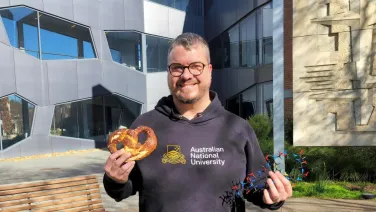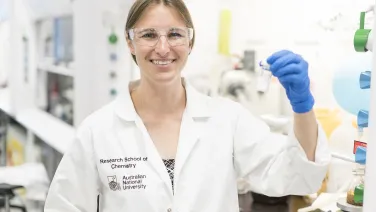ANU researcher awarded $8m to develop next-generation life-saving medical therapies

A chemist from The Australian National University (ANU) has been awarded a prestigious $8 million fellowship to help tackle some of the globe’s most pressing health challenges, including antimicrobial resistance and cancer, and advance new life-saving medical therapies.
Professor Lara Malins from the ANU Research School of Chemistry is one of two new Snow Medical Research Fellows for 2024.
Her goal is to fine-tune naturally occurring chemical compounds and re-deploy them as powerful new therapies for human illnesses.
Alongside her ANU team, Professor Malins hopes to unleash the therapeutic capacity of peptides, or short chains of amino-acids, a “largely untapped reservoir” when it comes to medicinal chemistry.
“As structural relatives of proteins, peptides are biological powerhouses, but while our understanding of them is growing, clinical progression has been limited due to the challenges in synthesising and optimising them in the lab,” Professor Malins said.
“The specific compounds we’ll be looking at have considerable potential as next-generation medicines — including peptide-based cancer therapies. This investment from the Snow Medical Research Foundation will help fuel the drug discovery pipeline and ultimately, enhance our ability to treat human disease.”
Professor Malins will also use her fellowship to continue her work on new antimalarials and antibiotics.
“Nearly 100 years after the discovery of penicillin, we’re on the brink of a ‘post-antibiotic’ era, with rising levels of bacteria resistant to even our last resort antibiotics,” she said.
“Studies suggest that global antimicrobial resistance will lead to approximately 10 million deaths and an economic cost of $US100 trillion per year by 2050. To avoid repeating the cycle of antibiotic development and resistance, we need to look at new avenues.”
ANU Vice-Chancellor and President Genevieve Bell congratulated Professor Malins on her Snow Medical Research Fellowship.
“I am delighted that Lara has been recognised with the Snow Medical Research Fellowship. Her research is cutting edge, using biological and chemical tools to develop therapies that will help us treat malaria and cancer, as well as create next-generation antibiotics,” she said.
“Her research is going to have real and meaningful impact for people across Australia and the world – and that’s an extraordinary achievement and medical legacy.
“I also thank Snow Medical for supporting research to ensure our academics can address some of the most pressing challenges of the 21st century.”

Chair of Snow Medical, Tom Snow, added: ”We are delighted to support Lara’s important work. She is a true example of Snow Medical’s aim to support researchers who will shape the next generation of health and medical innovation.”
“In Lara’s case, she will focus on harnessing the power of peptides to develop new therapies, ultimately enhancing our ability to treat human disease.
“We’re also delighted to see a chemist awarded a Snow Fellowship for the first time. The proposed work of Lara and her team will have cross-cutting impacts in chemistry, biology and medicine.”
The second 2024 Snow Fellow is Associate Professor Loic Yengo from The University of Queensland.
About Snow Medical Research Foundation
The Snow Medical Research Foundation (Snow Medical) is at the forefront of philanthropic efforts to advance biomedical research in Australia.
With a commitment now totalling $224 million, Snow Medical supports the development of outstanding biomedical research leaders and their teams, driving innovation and excellence in healthcare solutions for the future.
This article was first published by ANU Reporter.



